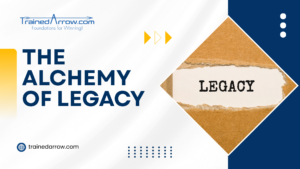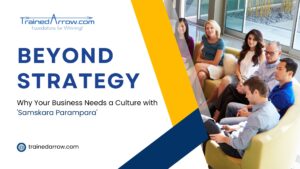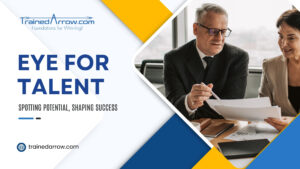
The Alchemy of Legacy … the soul-print we can leave in a fast-moving world!
In earlier times, life was simple. The past used to be with us. Families passed down not just names, but stories, values, and wisdom. The
![]()
With the rapid pace of change in today’s business environment, the attitudes and preparedness your talent needs are changing. And the secret sauce of talent development lies in strengthening people to evolve, enable change and find fulfillment in their professional pursuits. Talent development, then, must become self-sustaining as the Agile minds team up with emerging business models. Currently, businesses look to skills development to meet learners’ (and the business’) needs. But upskilling and reskilling efforts, in isolation, will result in a disconnect counter to creating a resilient, human-centric business. It is a strategic necessity for L&D leaders to commit to developing learners by imparting foundational skills and business acumen alongside their sense of self-awareness.
Strengths learners gain from foundational acumen include learning agility, resilience and adaptability. By increasing their sense of self-awareness, they gain greater accountability, career fulfillment and spiritual well-being.
Combined, these strengths manifest a professional poise in employees for connecting with the future of learning and work. These strengths should be culturally embedded, along with skilling efforts, regardless of the organization’s size, market agility and limitations. But huge challenges remain in making foundational skills and a culture of self-awareness and intrinsic satisfaction a reality. These challenges include:
Uncommon backgrounds: The workforce doesn’t come prepared with optimal readiness — or with a common level of acumen and intellect. This presents significant challenges for talent development in three areas: learnability, learning agility, collaborative mindsets, and adaptability.
People’s view of success: Many people are conditioned to view success in terms of hierarchical or material gains. We need to redefine success in terms of finding value and career fulfillment.
People as the future: Organizations must view their employees, firstly, as humans, as change enablers, not just as resources. Despite the quintessential “people-first philosophy,” many leaders often chase up task readiness and disregard human-centric strengthening.
View L&D as corporate social responsibility (CSR): Consider talent development as an element of CSR to build people for adaptability and psychological well-being to support a sustainable social ecosystem.
The art of harnessing strengths for learning, exploring and versatility, unwittingly has genesis in foundational acumen. Foundational essentials, a comprehensive acumen of business-technology aligned ecosystem galvanizes contextualization and rational thinking, motivates people to learn and participate, solve problems and create value. This prepares learners for the daily grind of value chain activities and maximizes their potential by improving learning agility, resilience and adaptability.
The secret sauce of talent development lies in strengthening people to evolve, enable change and find fulfillment.
Learning Agility (Learnability and Learning Agility)
Both learnability and learning agility are tiered strengths that make up the continuous learning attribute, and cope with change which are key strengths for a learning organization.
Learnability is the candidacy for being coachable to work in new business and technology environments.
Learning agility is the readiness to acquire new knowledge and skills to perform in new business and technology environments.
Most organizations endure a chronic limitation in their readiness to transform due to a lack of learning agility in their workforce. Yet, this strength is often overlooked as a key to talent development.
Professional Resilience (Contextualization, Flexibility and Grit)
Resilient employees enable resilient organizations. Professional resilience comes from an “organized mind” built on fortitudes of foundational acumen and emotional composure. As a collective strength for any organization, it has become very crucial as the ability to deal with the unexpected is the norm. This strength, when nurtured and built into the culture, can also significantly reduce the number and size of challenges for any organization.
Adaptability (Engagement, Motivation to Explore and Innovate)
Adaptability is the ability to adjust and perform to deliver on new work requirements. Foundational acumen acts as ‘recesses of mind’ to render engagement to relate and evolve, motivate to inspire novel solutions, co-create future state to meet changing business, operational and organizational needs. This assumes strategic proportions because agile operating models are a business imperative.
Research has shown that organizations struggle to understand the path required to achieve adaptability. This is especially true for businesses that are built around “scale and process” efficiencies.
Self-awareness is the most essential learning of all. Too often, we embark on new challenges without enhancing ourselves first. This is a fundamental flaw. By developing self-awareness, employees can develop a capability to consciously process thoughts, emotions, perspectives and behaviors, and experience greater clarity and emotional balance. Self-awareness offers employees a mindset that helps to motivate themselves and others, equips and reinforces accountability, and fosters career fulfillment and spiritual well-being.
Accountability (Highest, Integrity and Ownership)
Accountability requires one’s highest self — an inner strength to manage unwelcome emotions, situations and own up to eventual outcomes. When nurtured, this enables a growing sense of ownership and accountability to shape themselves and the business for a better future. The pursuit of self-awareness is an organic way of developing accountability in any circumstance.
Career Fulfillment (Sense of Achievement and Purpose)
People’s careers make up a large portion of their lives. Gaining clarity about what to seek from life is the first step for career fulfillment. It allows people to find meaning and a higher purpose for life — what they do for a living, explore meaningful work, and what to pursue moving forward. Such clarity then shapes a personality grounded in fulfillment and reflects their authentic self.
Spiritual Well-being (Sense of Oneself, Ability to Evolve, Skills in Action)
Spiritual well-being means being peaceful and joyous with yourself. This is an effort for moving to a higher level of perception to maintain a sense of oneself, live in harmony with self and others, and stay disentangled from the frustrations of daily life. This transformational endeavor is meant to establish the “being for action” — the essential aspect of “skills in action” — in other words, moving from a compulsive state of action to a conscious state of action is the key benefit of spiritual well-being.
Talent development must presuppose fortifications to help learn, unlearn and transform to realize the evolving nature of value. It also requires igniting intrinsic knowledge to harness the power of human intellect for introspection, big picture, value creation, accountability, resilience, adaptability and a higher purpose for career fulfillment. Such wholesome coherence and competence ought to shape organizational culture, where learning breeds evolution and action for sustenance and growth.
Business and L&D leaders should root talent development in the noble purpose of imparting these strengths to bridge the gap between formal education and contemporary skills, to evolve to adapt and enable change, and to live a joyous life and maintain a fulfilling career. And, most emphatically, to embed adaptability DNA in their organizations. Reliably, these strengths will build an impactful workforce for long-term vitality in any economy.
The pursuit of self-awareness is an organic way of developing accountability in any circumstance.

In earlier times, life was simple. The past used to be with us. Families passed down not just names, but stories, values, and wisdom. The
![]()

Okay, listen up. We’re all chasing the next big tech flex and the fastest quarterly win. But what happens when the founder retires, or the
![]()

Can you? Read this short story: A senior leader who once worked closely with the Reliance Group of India shared this story with me –
![]()
We are passionate about people development and transformation. Our courses are designed for: College Graduates, Corporate Employees, and Entrepreneurs. Interested?
trainedarrow@samprad.net
+1-609-658-3053